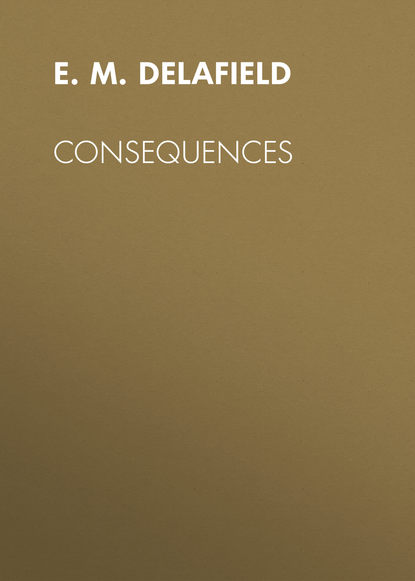По всем вопросам обращайтесь на: info@litportal.ru
(©) 2003-2024.
✖
Consequences
Настройки чтения
Размер шрифта
Высота строк
Поля
The young man beside her needed no more to make him launch out into emphatic speech.
Alex was half frightened, as she watched the glow in his eyes and the rapid gesticulations of his hands, as though emotion had startled him into a display of the racial characteristics that he habitually concealed so carefully.
He told her crudely that he adored Queenie, and that it drove him nearly mad to see her in the company of other men.
"But why don't you ask her to marry you?" exclaimed Alex innocently.
Goldstein stared at her.
"I have asked her fourteen times," he said at last with a slight gasp.
"Fourteen times!" Alex was astounded.
According to her preconceived notions a proposal was carefully led up to, uttered at some propitious moment, preferably by moonlight, and then and there either definitely accepted or rejected.
"But I shouldn't have thought you'd even seen her fourteen times," she remarked naïvely.
"I see her every day," Goldstein said gloomily. "It's playing the deuce with my business. You won't give me away, I know – you're her friend, aren't you? – and people are so stupid and conventional, they might talk."
Alex remembered Lady Isabel. Was this what she had meant?
"I can always manage to see her. I know her movements, and when I can meet her, and when I may take her out to lunch or tea – some quiet place, of course."
Alex was puzzled.
"But are you engaged?"
"Yes, a thousand times!" he answered in low, vehement tones, and then appeared to recollect himself. "She has never said no, although I can't induce her to say yes," he admitted; "and I have to see her surrounded and admired everywhere she goes, and have no hold on her whatever. If she would only marry me!" he made a gesture of rather theatrical despair, indicating the far corner where the young Dane still sat, oblivious of everything but Queenie, drooping over the small round table that separated them.
"Cad! he's going to smoke," Goldstein muttered furiously below his breath.
The room had emptied, and Alex saw Queenie deliberately glance over her shoulder, as though to make sure of being unobserved. Her eyes moved unseeingly across Alex and Maurice Goldstein. The rest of the room was empty. With a little half-shrug of her white shoulders she delicately took a cigarette from the case that the diplomat was eagerly proffering.
It was the first time that Alex had seen a woman with a cigarette between her lips. She felt herself colouring hotly, as she watched, with involuntary fascination, Queenie's partner carefully lighting the cigarette for her, his hand very close to her face.
She dared not look at Goldstein. The cheap vulgarity of Queenie's display of modern freedom shocked her sincerely, nor could even her inexperience blind her to the underlying motive governing Queenie's every gesture.
She fumbled hastily for her fan and gloves.
"Shall we come upstairs again?" she asked in a stifled voice.
Goldstein rose without a word.
Alex, venturing to cast one glance at him, saw that his face had grown white.
As he took her back to Lady Isabel, he spoke in a quick, low, dramatic voice between clenched teeth:
"You saw? She knows she is driving me frantic; but after this – it's all over."
Alex was frightened and yet exultant at playing even a secondary rôle in what seemed to her to be a drama of reality.
An hour later, sitting, for the time being partnerless, beside her mother, she saw Queenie re-enter the ballroom, followed by the Dane.
Queenie's widely-set eyes were throwing a glance, innocent, appealing, the length of the long room. At once her eyelids dropped again. But in that instant Maurice Goldstein had left the wall against which he had been leaning, listless and sulky-looking, and was making his way through the lessening crowd.
Alex, wondering, saw him reach the side of the tall, white-clad figure, and claim her from the young diplomat.
He gravely offered Queenie his arm, and Alex saw them no more that night. She herself drove home to Clevedon Square beside Lady Isabel with her mind in a tumult.
She felt that for the first time she had seen love at close quarters, and although a faint but bitter regret that the experience had not been a personal one underlay all her sensations, she was full of excitement.
"No more late nights after this week," said Lady Isabel, her voice sleepy. "A rest will do you good, Alex. You are losing your freshness."
Alex scarcely listened. She stood impatiently while the weary maid, whose duty it was to sit up for her mistress's return, undid the complicated fastenings of her frock, and took the pins out of her hair.
"I'll brush it myself," said Alex hastily. "Good-night, mother."
"Good-night; don't come down till lunch-time, Alex – we are not doing anything."
Alex carried her ball dress carefully over her arm and went up one more flight of stairs to her own room, wrapped in her pink dressing-gown, and with her hair loose on her shoulders.
Sitting on the edge of her bed and gazing at her own reflection in the big, swinging mirror, she made personal application of the small fragment of human drama that she had just witnessed.
What man would speak and think of her as Maurice Goldstein spoke and thought of Queenie Torrance?
When would any man's ardent glance answer hers; any man make his way to her through a crowd in response to the silent summons of her eyes?
She fell into one of the idle, romantic dreams evoked by a highly-strung imagination, untempered by any light of experience. But the hero of the dream was a nebulous, shadowy figure of fiction. No man of flesh and blood held any place in the slender fabric of her fancies.
It occurred to her, more with a sense of disconcertment than of that panic which was to come later, that she did not possess the power of drawing any reality from her communion with others, and that no intimacy other than one of the surface had as yet ever resulted from any intercourse of hers with her fellow-creatures. Her nearest approach to reality had been that one-sided, irrational adoration of her schooldays for Queenie Torrance, that had met with no return, and with so much and such universal condemnation.
Alex did not doubt that the condemnation was justified. The impression left upon her adolescent mind remained ineradicable: it was wrong to attach so much importance to loving; it was different, in some mysterious, culpable way, to feel as she did – that nothing mattered except the people one loved, that nothing was so much worth while as the affection and understanding which one knew so well, from oneself, must exist, and for the bestowal of which on one's own lonely, ardent spirit one prayed so passionately; and all these desires, being wrong and unlike other people, must at all costs be concealed and denied. Thus Alex, placing the perverted and yet unescapable interpretation of her disconsolate youth upon such experience of life as had been vouchsafed to her.
Still sitting on the side of the bed and facing the looking-glass, she sought in her own reflection for traces of the spell wielded by Queenie Torrance. She had not yet outgrown the belief that beauty and the power to attract should be synonymous.
Was she as pretty as Queenie?
Her colour was bright and pure, and her hazel eyes reflected the brown lights gleaming in her soft, tumbled hair, that fell no lower than her shoulders. She reflected disconsolately on the undue prominence of the two, white front teeth that the plate which had tormented her childhood had just failed to render level with the others.
Straight brows added to the regularity of her features, only the corners of her mouth habitually drooping very slightly. The angularity which Lady Isabel so regretted was sharply manifested in the exposed collar-bones just above the open dressing-gown, and in the childishly thin arms and wrists. With an odd, detached shrewdness, she appraised the prominent attributes of her own appearance, its ungraceful immaturity.
As she got slowly into bed, she passed other, moral, attributes, in fleeting review.
Alex believed that one might be loved for one's goodness, if not for one's beauty. But she could not suppose herself to be good. The tradition of the nursery black sheep still clung to her.
Should love come to her, she had nothing but the force of the answer within her to bring to it, and that force she had been taught to think of in the light of an affliction to be overcome.
Yet Alex Clare fell asleep smiling a little, nursing the foolish, romantic fancies that usurped the place of realities, and unaware that the temperament which craves to give all, is often that of which least will ever be asked.






